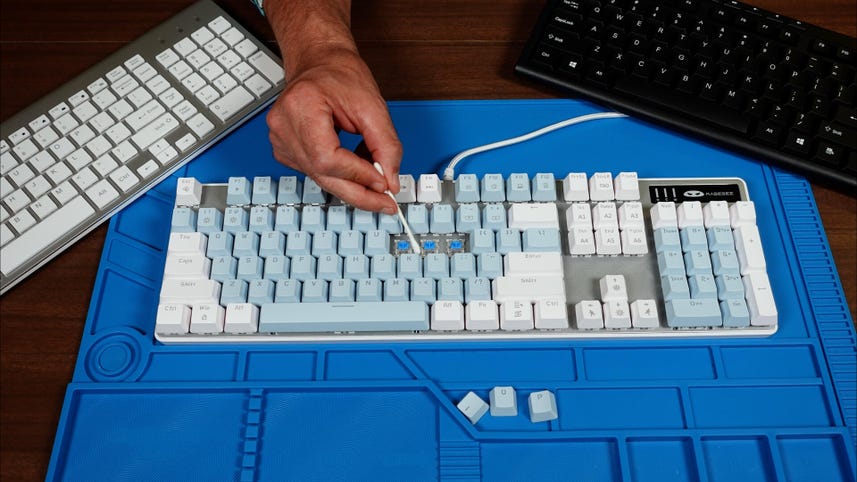How to Fix Sticky Keys on Mechanical Keyboard
To fix sticky keys on a mechanical keyboard, clean the affected keys using a cotton swab dipped in isopropyl alcohol. Mechanical keyboards are popular among gamers and typists due to their durability and responsive keys.
However, over time, these keyboards can develop sticky keys, which can hamper performance and accuracy. Fortunately, resolving this issue can be done by following a few simple steps. By cleaning the affected keys using isopropyl alcohol and a cotton swab, you can eliminate any dirt or grime that may be causing the keys to stick.
This will restore smooth and seamless functionality to your mechanical keyboard, ensuring an optimal typing or gaming experience.

Credit: www.cnet.com
Common Causes Of Sticky Keys
Sticky keys on a mechanical keyboard can be caused by dust and debris buildup, spillage or liquid damage, and worn-out or damaged keycaps. Dust and debris can accumulate over time, causing keys to stick and affect typing performance. Spillage or liquid damage can also lead to sticky keys, as liquid seeps into the mechanical switches and interferes with their functionality.
Additionally, worn-out or damaged keycaps can cause keys to become sticky and unresponsive. To fix these issues, you can clean the keyboard by carefully removing keycaps and using compressed air or gentle cleaning solutions. If the keycaps are worn out or damaged, you may need to replace them with new ones.
Regular maintenance and cleaning can help prevent sticky keys and ensure smooth and efficient typing experience on your mechanical keyboard.
Troubleshooting Techniques
Troubleshooting sticky keys on your mechanical keyboard can be solved using these techniques. Firstly, for proper cleaning, remove keycaps and use compressed air to remove debris. Secondly, opt for isopropyl alcohol to thoroughly clean your keyboard. When dealing with liquid damage, disconnect the keyboard immediately, dry it properly, and clean the affected components.
Lastly, if you have worn-out keycaps, identify the damaged ones, remove the old ones, and install and test new keycaps. By following these steps, you can effectively fix sticky keys on your mechanical keyboard and ensure smooth functionality.
Preventive Maintenance Tips
Regularly cleaning your keyboard is an essential preventive maintenance tip to fix sticky keys on a mechanical keyboard. Develop a cleaning routine that includes wiping the keys and the surface with a microfiber cloth. Spill-proofing measures can also prevent sticky keys.
Invest in a keyboard cover to provide an extra layer of protection against spills and dust. Be mindful of removing and cleaning the cover regularly to avoid the accumulation of dirt and debris. By following these tips, you can maintain your mechanical keyboard and prevent sticky keys from becoming a recurring issue.
Keep your keyboard clean and in good working condition for an optimal typing experience.
Frequently Asked Questions On How To Fix Sticky Keys On Mechanical Keyboard
How Do I Fix Sticky Keys On My Mechanical Keyboard?
If your mechanical keyboard’s keys are sticking, try using compressed air to remove any debris. If that doesn’t work, you may need to remove the keycaps and clean the switches with a safe solvent. Remember to let everything dry completely before reassembling.
Can I Use Water To Clean Sticky Keys On My Mechanical Keyboard?
It is generally not recommended to use water to clean a mechanical keyboard, as it can damage the switches. Instead, opt for a safe solvent specifically designed for cleaning electronics. Be sure to follow the manufacturer’s instructions and allow everything to dry thoroughly before using the keyboard again.
What Causes Sticky Keys On A Mechanical Keyboard?
Sticky keys on a mechanical keyboard are often caused by debris, such as crumbs or dust, getting stuck in the switches. Over time, this accumulation can affect the performance of the keys. Regular cleaning and maintenance can help prevent this issue.
How Often Should I Clean My Mechanical Keyboard?
It is recommended to clean your mechanical keyboard at least once every few months, depending on your usage. If you notice any sticky or unresponsive keys, it may be time for a cleaning. Regular maintenance will help prolong the lifespan of your keyboard and ensure optimal performance.
Can I Lubricate The Switches To Prevent Sticky Keys?
Yes, lubricating the switches can help prevent sticky keys. However, it is essential to use the correct lubricant and apply it sparingly. Too much lubricant can cause issues with the keyboard’s functionality. It is recommended to consult the manufacturer’s guidelines or seek professional assistance for lubrication.
Conclusion
To sum up, fixing sticky keys on a mechanical keyboard can be a frustrating experience for any user. However, with the right knowledge and steps, this issue can be easily resolved. Firstly, it is important to identify the cause of the stickiness, which could be due to dust or debris, worn-out key switches, or an incorrect typing technique.
Once identified, cleaning the keyboard thoroughly using compressed air and a soft cloth can remove any dirt or particles that may be causing the keys to stick. If the issue persists, replacing the key switches might be necessary. It is recommended to consult the keyboard manufacturer’s guidelines or seek professional help for this step.
Lastly, developing proper typing techniques and maintaining regular keyboard cleaning habits can prevent sticky keys from occurring in the future. By following these steps, users can restore their mechanical keyboard to its optimal performance and enhance their typing experience. Remember, a well-maintained keyboard leads to smoother typing sessions and improved productivity.
